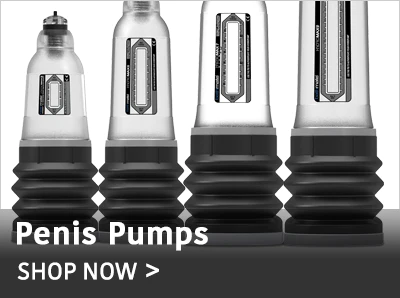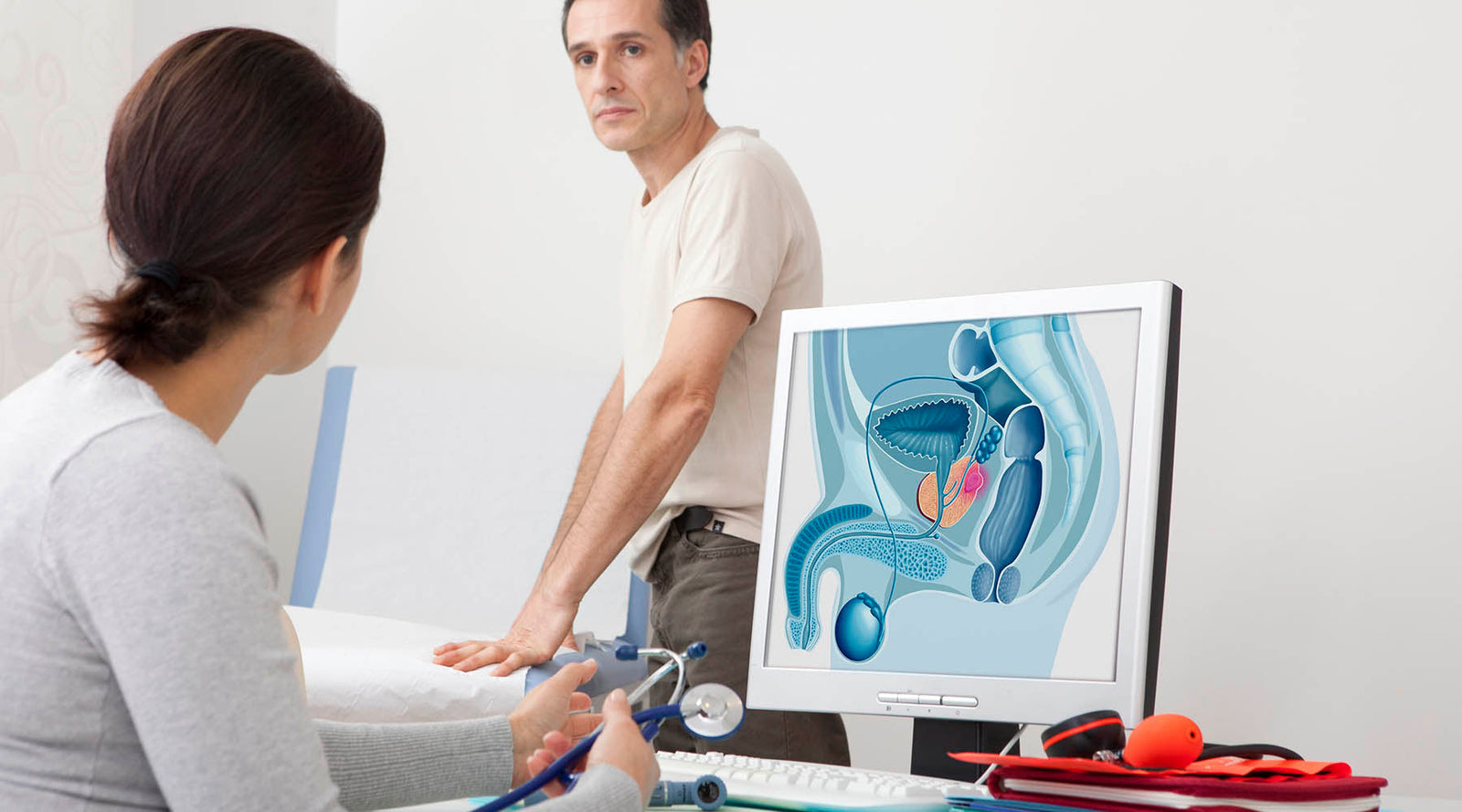How It Works Mobile
Health Benefits Mobile

How to Keep Your Prostate Happy and Healthy
How to Keep Your Prostate Happy and Healthy
8 min read
8 min read
*This article is for informational purposes only. It is not meant to be a substitute for medical advice or treatment. Please consult your urologist, physician, or health care provider if you have more questions about this topic.
For such a small part of the body, the prostate has an outsized effect on a man's health. Prostate cancer is definitely the elephant in the room when discussing prostate health, but keeping this important gland happy is about much more than that. Poor prostate health can lead to erectile dysfunction and urinary incontinence, both of which have a severe impact on quality of life. The good news is, there are well-understood and easy-to-implement steps you can take to keep your prostate healthy and happy and lead you on the road to attaining prostate wellness. Read on to learn more about this special gland and what it does for you.

What is the Prostate and What Does it Do?
First, let's get the basics out of the way. The prostate is a relatively small gland about the size of a walnut that sits under the bladder where it straddles the urethra, deep behind the base of your penis. Its primary function is to nourish your sperm as they make their way from the testicles through the urethra by secreting prostatic fluid which contains nutrients that keep the sperm pumped up on their single journey.
Additionally, this fluid contains enzymes that make semen lighter and more fluid, allowing the sperm to swim freely.
Also, significantly, the gland closes off the urethra-bladder route as you ejaculate. This ensures that sperm don't go the wrong way and that urine doesn't flow down and interfere with the ejaculation process. Important stuff!

Common conditions affecting prostate health
Here are some common conditions affecting prostate health:
- Prostate cancer is the second most detected cancer among men globally as of 2020, with 1 in 8 men receiving a diagnosis during their lifetime. Men of age 50+ and those with a family history of the disease are at higher risk.
- Benign prostatic hyperplasia (BPH) is marked by considerable swelling of the prostate that is free of cancerous cells.
- Acute bacterial prostatitis is a sudden infection of the prostate that can cause symptoms such as fever, chills, and pain around your groin and lower back.
- Chronic bacteria prostatitis differs from an acute infection in the way that it can develop slowly and keep reoccurring with similar symptoms.
- Chronic pelvic pain syndrome is a common problem marked by pain in the lower back, pelvic area, and sometimes at the tip of the penis.
Thankfully, all it really takes to promote prostate health and maintain healthy sexual and urinary function is a healthy lifestyle. Let's get into some specifics!

Simple Ways To Keep Your Prostate Healthy and Happy
One side benefit of maintaining prostate health is that, not only do you keep your prostate healthy, but these guidelines can improve your everyday life, helping you achieve and maintain your body's overall health.
- Stay active to support prostate health
Inactivity is a trigger for benign prostatic hyperplasia. A sedentary lifestyle can put you at risk of developing BPH and other related conditions. Combat this with regular exercise during the week. This doesn't mean you have to run marathons or pump iron. Your goal should be to maintain a healthy weight through simple physical activities like brisk walks or jogging for half an hour.
Studies at Harvard Medical School showed that regular exercise helps keep BPH at bay. In fact, related research also showed that physical activity provided relief from chronic prostatitis pain.
- Steer clear of alcohol and smoking
Indulging in alcohol frequently over a long time has been shown to heighten the risk of prostate cancer. A study sponsored by the American Institute for Cancer Research revealed that men who drank at least 5 times a week were 3 times more likely to develop prostate cancer.
Smoking can also wreak considerable havoc on this important gland. Scientists conducted a 6-year study which found that smokers were twice as likely to develop severe cancerous complications in the prostate.
- Manage mental health stress
Stress, depression, and anxiety can do a lot of damage to the reproductive system. Researchers found that high levels of stress and poor emotional health led to increased hormones that encourage prostate growth and increase your chances of getting chronic pelvic pain syndrome.
If you are one of the many men who struggle from time to time with mental health issues, find a support network or get therapy from a professional. In addition, a good night's sleep is your first line of defense against stress levels. Your prostate - and your body - will thank you for it.
- Cut down on processed foods
Many processed foods, especially those guilty pleasures we eat on cheat days, aren't good for glandular health. Many processed foods lack beneficial nutrients and contain trans fats which have been connected to unhealthy heart and weight, both risk factors in contracting prostate cancer.
The same goes for dairy and processed red meat products such as hot dogs. These contain saturated fats that wreak havoc on your body, putting you at increased risk of harming the gland.
- Try hormone therapy
The male sex hormone testosterone plays a large role in developing and maintaining the function of the prostate. However, as men age, their testosterone levels drop, leading to a loss of some of the gland's vitality.
Hormone replacement therapy is one viable way to restore prostate health. It also doesn't hurt that getting your testosterone levels back to normal builds muscle mass and reduces fat accumulation.
That means you can exercise more energetically to trigger the benefits of engaging in physical exercise, prevent and lower risk for prostate disease.
- Embrace regular screening
The gloved finger is something you should welcome regularly, at least once a year. Those few seconds of discomfort can help you get ahead of potential prostate problems before they balloon into something more complicated.
A regular digital rectal exam is particularly crucial for men entering the twilight of their lives. The closer you are to 50, the higher your risk of developing BPH and/or prostate cancer. A doctor will also do a blood test to detect prostate-specific antigen (PSA), a marker for potential issues with the gland.

A healthy diet to prevent developing prostate cancer
There are non-medical ways to help prostate health, and by far the easiest is through diet. For many people, maintaining a healthy weight through exercise can seem like an impossible challenge. However, it can be much easier to see results when you pair your light workouts with a healthy and balanced diet.
Not only does this combination help with weight loss and keep your heart healthy, but it also puts you at a lower risk of developing BPH, cancer, and infection.
So, what does this diet entail?
The best food for prostate care includes oily fish containing omega-3 fatty acids, vegetables, and foods containing healthy mono-unsaturated fats like avocados, nuts, and olive oil. In addition, foods that reduce the risk of cancer such as rice and spinach are also beneficial for the prostate. If you picture the Mediterranean diet and lifestyle, you're already well on your way to understanding what you need to keep your prostate healthy.
Drink green tea and coffee
Green tea provides plenty of health benefits via the potent antioxidant epigallocatechin gallate (ECGC) which has been linked to improved heart health and a lowered risk of BPH, prostatitis, and cancer. As a side note, it is the ECGC compounds that give green tea its signature bitterness - a small price to pay to ensure a healthy prostate.
A systematic review conducted by Chinese scientists found that reasonable amounts of coffee consumption were also connected with prostate cancer prevention. So, looks like that morning cup does more than perk you up for a long day ahead. However, too much caffeine can introduce unwanted hypertension and an irregular, fast heartbeat, meaning that green tea is the better choice of the two.
So, what else should you feast on to keep the diseases at bay?
More fruits and vegetables
Keep an eye out for fruits and vegetables with bright, varied colors. These contain vitamins and antioxidants that help prevent cancer. For example, vivid, bright color red fruits like tomatoes and pink grapefruit contain the powerful antioxidant lycopene. Yellow foods like bell peppers contain beta-carotene, and blue/purple fruits contain anthocyanin and resveratrol.
For veggies, you can choose from brussels sprouts, broccoli, collard greens, or kale. Eating at least five servings per day should help.
Eat more legumes (beans, peas, and lentils)
Different kinds of beans, peas, and lentils are an excellent addition to your diet because they contain active biochemicals known as phytoestrogens. Of these, isoflavones do the most work when it comes to promoting prostate health.
In fact, they do more than reduce the risk of prostate cancer. They also protect the colon and rectum, the organs that support your prostate in the body. In other words, eating legumes protects the gland and the area around it, too.
Be measured with dairy products
A percentage of people are affected by inflammation when they consume milk products. While some studies suggest a link between regular-fat dairy and late-stage prostate cancer. We recommend considering cutting some of the fatty dairy food from your diet; low-fat milk products can still be included. After all, dairy provides much-needed calcium and vitamin D.
Eat more fatty fish and less red meat
Red meat and associated processed products increase the risk of prostate cancer due to additives and saturated fats. Adding healthy fats, like omega-3 fats, found in fish like salmon, sardines, and marlin can help overall health.
However, the jury is still out on their specific role in keeping the prostate healthy. In fact, some studies suggest that they do the exact opposite. Still, these fatty fish can still help because the omega-3 fatty acids stave off heart disease.
Add adequate amounts of folate to your diet
Folate, a form of vitamin B, is found in greens, orange juice, beans, and whole grains. This natural vitamin provides plenty of protection for your prostate gland, protecting it from cancer and other conditions.
However, take care not to substitute these foods with folic supplements. Folic acid is a synthetic version of the vitamin which studies have shown can actually increase the risk of prostate cancer.

5 natural herbs to treat an enlarged prostate
While cancer is a serious concern, so is preventing an enlarged prostate. In fact, BPH is actually the most common disease in men past 40.
Some natural extracts from plants have been shown to have a reduced risk of getting BPH.
- African plum: The pygeum extract contains beta-sitosterol, an anti-inflammatory and antioxidant that keeps the urethra area around the gland healthy.
- Babassu nut oil: Oil from this Brazilian palm inhibits testosterone production, limiting enlargement of the prostate. It also contains potent antioxidants.
- Cernilton: Found in ryegrass pollen, this natural ingredient relieves urinary symptoms associated with an enlarged prostate.
- Flaxseed: An ancient superfood. The seed hulls contain lignans like secoisolariciresinol diglucoside (SDG), a compound that can interfere with the formation of tumor cells in the prostate. Plus, the hard kernel within the hull contains omega-3 fatty acids which are good for heart health, and a healthy heart means a healthy prostate.
- Pumpkin seeds: Seeds from this popular vegetable are rich in zinc, a mineral vital in maintaining proper cardio and prostate health. Additionally, they contain phytochemicals that reduce the negative impact of dihydrotestosterone and are a natural source of fatty acids, that have many health benefits.
- Saw palmetto: Extracts from this plant inhibit hormone production, limiting the growth of the gland's inner lining.
- Stinging nettle: Like saw palmetto and African plum, this nettle root contains powerful antioxidants and anti-inflammatory properties that protect the prostate.

As should be clear by now, taking care of your prostate is really about taking care of yourself. All of the usual advice applies: exercise regularly, eat leafy greens and whole grains, seek out omega-3s and avoid red meat. Doing these things to ensure a healthy balance of vitamins and nutrition will keep your prostate healthy and free of cancer, and a healthy prostate is a happy prostate.
RELATED ARTICLES

How To Get Ready for Prostate Surgery
4 min read
Recent Articles
- 12 Types of Female Orgasms: How to Help Her Experience Each One
- Why I Recommend You Get a Tantric Couch
- The Downsides of Penis Enlargement Surgery: Risks and Alternatives
- Bathmate vs. Air Pumps
- Bathmate Results: Penis Pump Before & After
- Side Effects of Catuaba
- Health Benefits of Catuaba
- 12 Essential Tips for a Healthy Penis
- Can Quadriplegic Men Have Sex?
- Sexual Function for Men After Spinal Cord Injury
































